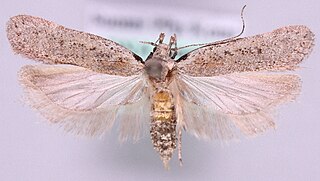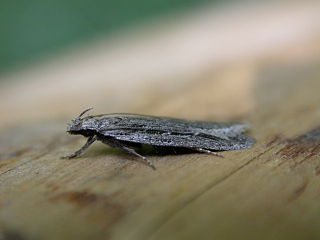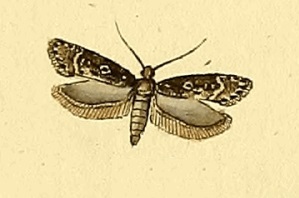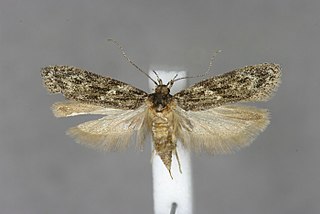
Sakhalin is the largest island of Russia. It is north of the Japanese archipelago, and is administered as part of the Sakhalin Oblast. Sakhalin is situated in the Pacific Ocean, sandwiched between the Sea of Okhotsk to the east and the Sea of Japan to the west. It is located just off Khabarovsk Krai, and is north of Hokkaido in Japan. The island has a population of roughly 500,000, the majority of which are Russians. The indigenous peoples of the island are the Ainu, Oroks, and Nivkhs, who are now present in very small numbers.

Sakhalin Oblast is a federal subject of Russia comprising the island of Sakhalin and the Kuril Islands in the Russian Far East. The oblast has an area of 87,100 square kilometers (33,600 sq mi). Its administrative center and largest city is Yuzhno-Sakhalinsk. As of the 2010 Census, the oblast has a population of roughly 500,000.

Karafuto Prefecture, commonly known as South Sakhalin, was a prefecture of Japan located in Sakhalin from 1907 to 1949.

Exoteleia is a genus of moths in the family Gelechiidae.

Gelechia is a genus of moths in the family Gelechiidae. The type species is Gelechia rhombella.

Tetheella is a monotypic moth genus in the family Drepanidae described by Werny in 1966. Its single species, Tetheella fluctuosa, the satin lutestring, was described by Jacob Hübner in 1803. It is found from western Europe across the Palearctic to Kamchatka, Sakhalin Island, Korea and Japan.
Anatrachyntis incertulella, the pandanus flower moth, is a small cosmet moth species. It belongs to subfamily Cosmopteriginae. This was the first "micromoth" species to be described from Hawaiʻi. The type specimens were collected there by the 1820s Beechey expedition and described by the English entomologist Francis Walker in 1864; they are now in the British Museum of Natural History.

The juniper gelechiid moth is a moth of the family Gelechiidae. It is known from most of Europe. It is an introduced species in Great Britain and North America through accidental introduction in garden junipers.
Gelechia flavipalpella is a moth of the family Gelechiidae. It is found in the Democratic Republic of Congo and South Africa.

Gelechia rhombella, the apple groundling, is a moth of the family Gelechiidae. It is found in Europe, the Caucasus, Transcaucasia, southern Siberia, the Russian Far East, Korea and China.

Gelechia sororculella, the dark-striped groundling, is a moth of the family Gelechiidae. It is widely distributed from Europe, throughout Siberia to the Russian Far East.
Gelechia jakovlevi is a moth of the family Gelechiidae. It is found in Finland, the Baltic region, Ukraine, the European part of Russia, Siberia and Mongolia.
Gelechia basipunctella is a moth of the family Gelechiidae. It is found in from central Europe to Russia, Turkey and Mongolia.

Gelechia muscosella, the grey sallow groundling, is a moth of the family Gelechiidae. It is found in Europe. It is also found in the Caucasus, Siberia and the Russian Far East.

Gelechia turpella, the grand groundling, is a moth of the family Gelechiidae. It is widely distributed in Europe. Outside of Europe, it is found from the Caucasus to Siberia and the Russian Far East. The habitat consists of woodlands and parks.

Gelechia scotinella, the thicket groundling, is a moth of the family Gelechiidae. It was described by Gottlieb August Wilhelm Herrich-Schäffer in 1854 and is found in almost all of Europe. The habitat consists of mature hedgerows and scrubland.
Gelechia cuneatella, the long-winged groundling, is a moth of the family Gelechiidae. It was described by Douglas in 1852. It is found in northern, central and eastern Europe, Russia, China and Japan. The habitat consists of river banks and marshes.
Phtheochroides clandestina is a species of moth of the family Tortricidae. It is found in the Pamir Mountains of Central Asia, in Japan and the Kuril Islands.

The Soviet invasion of South Sakhalin, also known as the Battle of Sakhalin, was the Soviet invasion of the Japanese portion of Sakhalin Island known as Karafuto Prefecture. The invasion was part of the Soviet–Japanese War, a minor campaign in the Asian Theatre during Second World War.

Helastia clandestina is a moth of the family Geometridae. This species is endemic to New Zealand. It is classified as "At Risk, Relict'" by the Department of Conservation.













